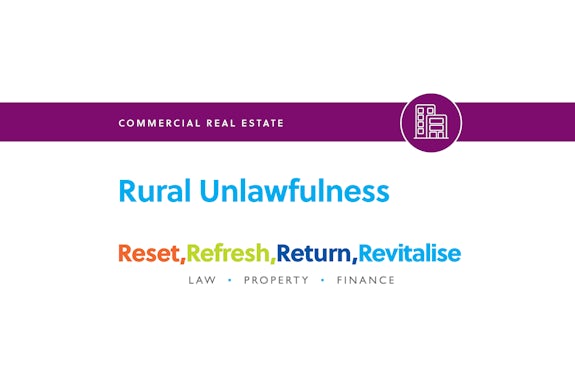
May 2, 2025

One of the many implications of lockdown and changed lifestyles and social interaction as a result of the COVID-19 pandemic has been the significant increase in rural farmers and other landowners reporting unlawful entry and use of their land.
The most common issue has been fly-tipping – the unlawful and unauthorised dumping of waste. Any landowner who discovers fly-tipping is faced with the immediate question of what to do – who to contact, whether to clear and remove it, whether it is their responsibility, etc.? In theory, if the fly-tipping is on the highway or public land, it is the responsibility of the local authority. If it is on private land, it is the responsibility of the owner or occupier of that land.
The extent of the highway is not always obvious and is not necessarily evidenced by, for example, the extent of any tarmac. In many cases the local authority may have a greater responsibility than may first appear, and highways searches coupled with title plans may well prove invaluable in the event of dispute. On the other hand, land which may be assumed to be in public ownership may actually belong to a private landowner.
If, having made enquiries, a landowner is responsible for the disposal of the fly-tipped material then the landowner must be careful as to how to dispose of it. Simply digging a hole and burying it may be tempting if the material is large or cumbersome. But in doing so the landowner may be committing an offence under environmental law. The disposal of waste is closely regulated, with fines, penalties and criminal sanction for any breach, and so advice must be taken before committing to disposal in this way.
Fly-tipping can place a costly onus on a landowner to remediate and so landowners are encouraged to be vigilant. As fly-tipping is largely opportunistic, fly-tippers will typically seek land which is isolated, out of immediate view of neighbouring buildings and which cannot be easily identified as belonging to a particular owner. Therefore, signs, CCTV, and fencing can often act as a deterrent.
If the fly-tipping has already happened, then look for clues amongst the waste – receipts or evidence of a name. If these are found, it should be reported to the police together with images of the dumped waste so they can then investigate the crime.
Another issue that has increased in recent months is trespassing – entering someone’s land or property without permission. This often entails day trippers visiting the countryside, walkers, campers and horse riders. Most are respectful of the environment they are in and keep to footpaths and bridleways, close gates and respect livestock in fields. However, inevitably some do not take as much care. The removal of any item found on private land constitutes a theft and so can attract criminal sanction. And if, for example, gates are left open leading to escape of livestock, then civil action can be taken against those responsible.
As trespass is a civil issue, the police will refuse to get involved unless a criminal act is committed such as theft, cutting down trees or lighting fires.
Landowners are therefore encouraged to erect signs to confirm land ownership, ensure gates are locked or latched and to clearly mark footpaths. If landowners see anyone on their private land, then they should proactively approach them, explain that the land is private and ask them to leave or to keep to public footpaths and bridleways.
Indeed, in recent weeks, there has been increased lobbying by the National Farmers’ Union, the Country Land and Business Association, the Tenant Farmers Association and the Countryside Alliance to change the current rules and regulations relating to public footpaths and bridleways where these cross fields with grazing livestock. Their concern is that the process is too difficult and longwinded if a farmer or other rural landowner wants to divert public rights of way, and that it should be much simpler to do this on at least a temporary basis. This is therefore an evolving area of law that requires careful thought, especially given the continuation of current unusual circumstances.
If you would like further information on the topic discussed in this article, please contact Mark Sabey by email: msabey@gilsongray.co.uk or by phone: 0141 530 2029 / 07984 016 171 . You can also view Mark’s profile by clicking here.
The information and opinions contained in this blog are for information only. They are not intended to constitute advice and should not be relied upon or considered as a replacement for advice. Before acting on any of the information contained in this blog, please seek specific advice from Gilson Gray.

Murray combines a pragmatic approach with his breadth and depth of expertise to deliver the best commercial outcome for his clients.